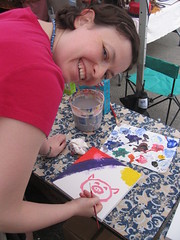Gender differences in sharing creative content online
Wednesday, June 25th, 2008This ArsTechnica write-up of some recent research of mine has received numerous votes on the recommendation site Digg in the last few hours. I wonder if it will make the front page of Digg, although as a Twitter contact of mine noted, since it’s not a top-10 list (nor, if I might add, does it cover Google or Apple), that may be unlikely.
The post reports on a study in which we found that male college students are more likely than their female counterparts to share creative content online even though both men and women in the sample are equally likely to create such content. However, when controlling for online skill, the gender differences in posting go away.
Gina Walejko and I published the paper “The Participation Divide: Content Creation and Sharing in the Digital Age” this Spring in the journal Information, Communication and Society. We examine the extent to which college students share creative content online and whether we can identify any systematic differences by user background. In particular, we looked at whether students create and share the following types of material: poetry/fiction, artistic photography, music, and video (both completely own and remixed in the case of the latter two), including both private and public sharing.
Administering a paper-pencil survey on a diverse group of over a thousand first-year college students at the University of Illinois, Chicago in 2007, we found that men are significantly more likely to share their creative output online than women. This was especially true for video (with 40% of men sharing such content compared to 15% of women), but holds for the other types of material as well.
Curious to see what explains these differences in sharing, we looked at whether various measures of Internet experience account for the divergences. We controlled for years of use, frequency of Internet use, number of Internet access locations, and online skill. Of these four, skill was a significant predictor of sharing activity. In fact, once skill is in the model, gender is no longer a significant predictor of posting one’s material.
There may be additional issues going on for which, I’m afraid, we have no data. For example, women may be more concerned about privacy issues or the critiques their content may receive. I’m working with another student on doing some qualitative follow-up work on this aspect of the question.
There are some more details in a press release Northwestern put out about the study or feel free to send me a note for a copy of the full paper.

